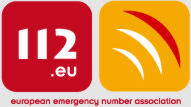Working under extreme stress, often with poor means, they are the first to support an upgrading.
Members of emergency services have often criticized EENA’s ideas of quality standards for answering and handling of calls to the 112 as well as evaluations by independent organisations. «How is it possible to implement quality standards and guarantee a maximal intervention time, when we do not dispose of adequate resources to do our job?», the president of the Belgian fire-fighters declared recently in a radio debate. And of course he is right. One cannot make an omelette without breaking eggs, goes the old French saying. Resources are certainly needed. And several emergency services all over Europe have been requesting improvements of telecommunications infrastructure and means.
It goes without saying that when EENA promotes the idea of an efficient 112 service chain, it does not pretend that this can be done free of charge. In our recent reply to the Commission’s consultation on the future of the telecommunications regulatory framework we even made some suggestions about the financing of the 112 operation. Either the telecom operators should be obliged to cover the costs in the context of the license (authorisation) they get to operate the networks. Or the Commission should issue guidelines for cost evaluation and allocation, following the example of the US which introduced legislation on this issue (the Ensuring Needed Help Arrives Near Callers Employing 911 or ENHANCE 911 Act), to provide the funding for the upgrading of 911 call centres. EENA could also support a cost allocation model involving the subscribers to networks through a small fee (e.g. 1 € per invoice) for the provision of services by the emergency services, on the condition that these services will be provided on the basis of high level quality standards concerning answering and handling of calls, intervention times, evaluation etc.
EENA has also been promoting interdisciplinary dialogue on common standards for emergency telecommunication systems. During the first two European 112 conferences we invited all interested parties to deal with the issue. We almost created a EU Forum for emergency telecommunications with BAPCO – an initiative that was unfortunately aborted for reasons we never understood. We are happy to participate actively at the PSC Forum which was subsequently created by emergency services and the industry and to be co-organising the 1st European Security and Safety Summit – to which all emergency services are invited.
But above all EENA supports the idea of high quality services provided by emergency services to EU citizens. Nobody can really claim that the quality of these services is the same in Scandinavia as it is in Southern Europe. Improving the quality of services provided in Southern Europe on a similar basis with this of the North will certainly benefit above all the citizens and the members of emergency services in the South more than it will benefit the tourists from the North. After all, tourists come and go - the locals are there to stay …
EENA also supports the idea presented by the European Commission in October 2005 for an exchange of best practices between emergency services of the different Member States. Relevant fora for such exchanges do exist (various EU committees, ETSI-EMTEL, etc.) but apparently emergency services rarely participate. However, EENA’s contacts in emergency services within Member States indicate that they are very often frustrated when for example they do not have the tools available to their colleagues elsewhere in the EU (localisation, multilingual support, etc.). Sometimes EENA is shocked to realise that of emergency services with solutions to common problems are unable to share them with their colleagues while at the same time other less important subjects are debated with questionable results in numerous meetings and workshops financed with taxpayer money. Is this the reason why the 112 is still one of Europe’s best kept secrets? EENA could not think of any valid reason why the issue of the 112 is still such a low priority or even ignored at EU level.
EENA believes that if emergency services are interested in improving the services they offer they need to start collaborating at EU level in view of establishing a common position with the citizens in mind. Using emergency telecommunications in general and the 112 in particular could prove an interesting test bed. It may be the only way they can persuade the elected politicians or bureaucrats who propose resource allocation to give them priority. It may be the only way to ensure that they are no longer underpaid, understaffed and under trained. It may be the only way to ensure they will get modern equipment that will make their everyday life easier and maybe less stressful. It sure is the only way to get the support of citizens, all over Europe to their cause. Furthermore EENA strongly believes that such a pan-European approach can lead to new European success stories, similar to the introduction of the GSM mobile telephony system, Galileo, the Airbus and others.
A first step to achieve this collaboration could be taken through the participation at the 1st European Security and Safety Summit in Brussels (6-7 June 2007).
Sunday, 18 February 2007
In praise of emergency services
Posted by eena112 at 2/18/2007 03:23:00 pm
Subscribe to:
Post Comments (Atom)

1 comment:
This is great info to know.
Post a Comment